- Author Matthew Elmers elmers@military-review.com.
- Public 2023-12-16 21:49.
- Last modified 2025-01-24 09:17.
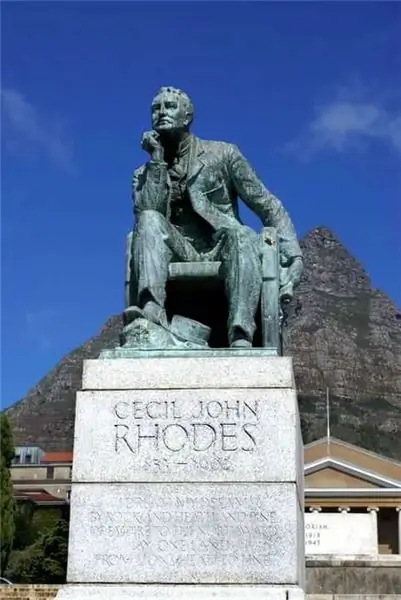
In this article, we will talk a little about the life and fate of Cecil Rhodes.
A world without heroes
You may have noticed that in modern films and books there are practically no heroes in the true sense of the word. The main characters are now, at best, unremarkable, unremarkable people from the crowd. But often some autistic people, street goofs or just notorious nerds. At the right time, they suddenly have some, completely undeserved by them, incredible abilities, supernatural strength. In general, a hamster, accidentally and against his will, got into the taiga, inevitably and inevitably turns into an Amur tiger. And negative characters do their best to play along with him, trying to make the stupidest decision, philosophize at the wrong moment, miss, shooting point blank, and so on. And even people who really existed, who changed the course of history by their activities, in the form of a compromise are portrayed as unremarkable philistines who achieved success only by chance, due to circumstances. This also applies to the hero of our article. Back in the early twentieth century, there were stupid rumors about Rhodes that he owed his fortune and influence to chance. According to this version, having arrived in Australia in 1870, he found the issue of the Times newspaper in the stomach of a caught shark. From it, Rhodes learned about the beginning of the Franco-Prussian War - and managed to convince one of the local rich to buy up all the wool, the prices of which soon went up sharply. This bike is still reprinted by various publications, regardless of the fact that Cecil Rhodes has never been to Australia. And it is impossible to find any happy accidents in his life: Rhodes achieved his position despite the circumstances, and not thanks to them.
This tendency is especially noticeable in the West, where real heroes have long irritated ordinary people, provoking an aggressive reaction and a desire to "debunk", "expose", "reveal the true essence." The realities of the era in which their ancestors had to live and act are not taken into account. Characteristic is the desire to judge (and condemn) the heroes of past eras according to the hypocritical "tolerant" criteria of the present time. And the stupid belief that you can behave in the jungle like in Disneyland. But, as it turned out quite recently, a recidivist and drug addict (the notorious J. Floyd) or a minor sociopath who escaped from school (Greta Thunberg) can easily become the idols of today's sub-passionaries.
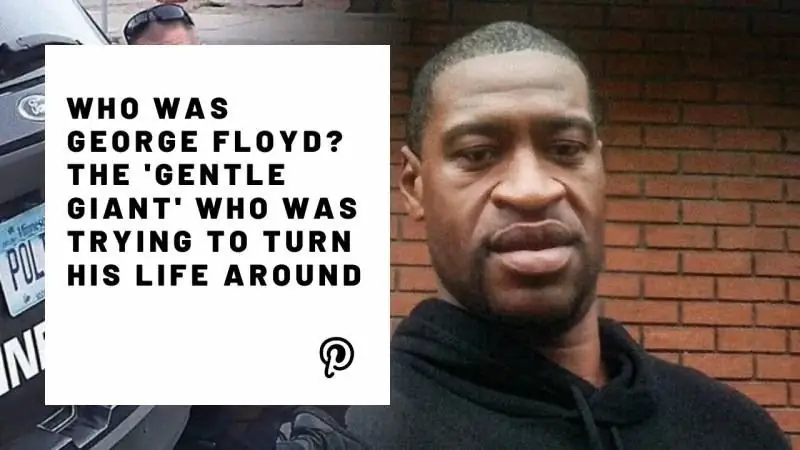

Almost all more or less significant figures, from Columbus to Churchill, have already fallen under the hand of liberals. In 2020, in the United States, 33 Columbus monuments were dismantled by local authorities or destroyed by BLM vandals (this famous navigator, it turns out, was also guilty before them). In American Richmond, for example, extremists drowned a statue of Columbus in a lake:

In Boston, local vandals decapitated the statue of Columbus (for the fourth time):
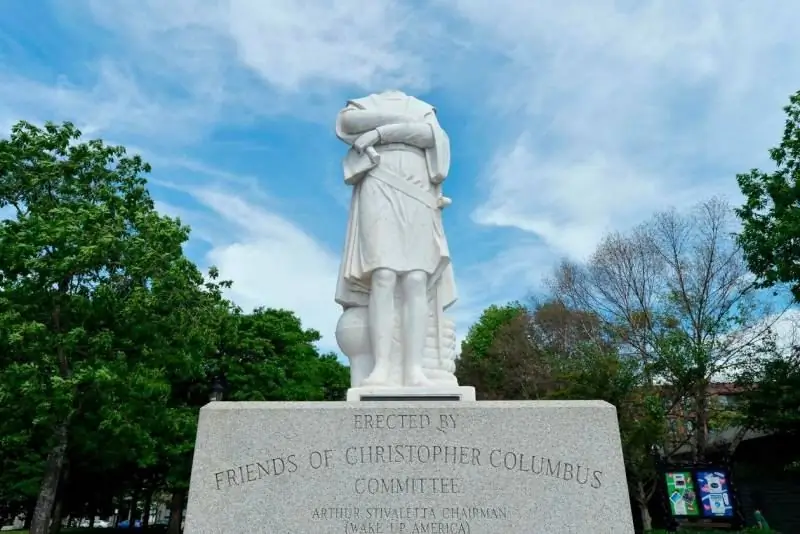
Here we see BLM extremists dumping a statue of merchant and philanthropist Edward Colston into the river in Bristol (June 7, 2020):

Colston spent huge sums of money to help almshouses, hospitals, schools, workhouses and churches throughout England, but especially in his native Bristol. According to the will, after his death, half of his fortune passed to various charitable organizations.
This is London, here the BLM vandals could not demolish Churchill's statue, but they desecrated it:
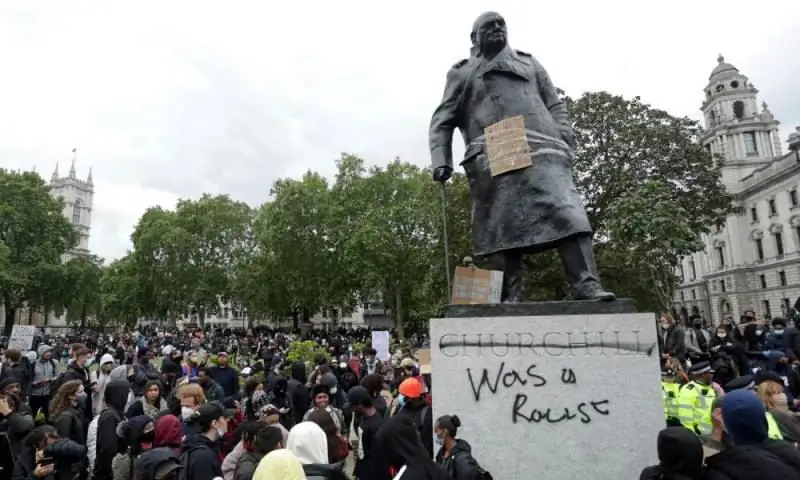
And Prague, where they have not lived with their minds for a long time, but look into the mouths of "civilized" Americans and British:
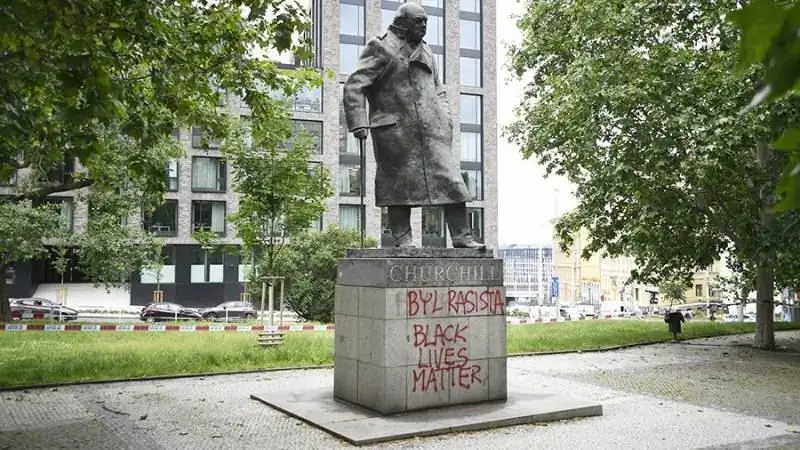
It remains a mystery why one of the leaders of the anti-Hitler coalition did not please them? Did they live so well and satisfyingly under the Fuehrer?
And in Russia we are already seeing signs of this madness. So, quite recently, the Tobolsk authorities, against the will of the citizens, cowardly excluded Yermak's name from the list of candidates for voting on the name of the new airport.
And in Karachay-Cherkessia in June 2021, at the request of the deputy of the Council of the Nogai region A. Turkmenov ("spravedlivoross", the former deputy minister of Karachay-Cherkessia for nationalities), they removed a poster with the image of … A. V. Suvorov, which was hung up for the Day of Russia.
The "Wrong" Hero Cecil Rhodes
The hero of our article is no exception, Cecil John Rhodes, who was simultaneously a conqueror, ideologist, politician, diplomat, industrialist and financier.
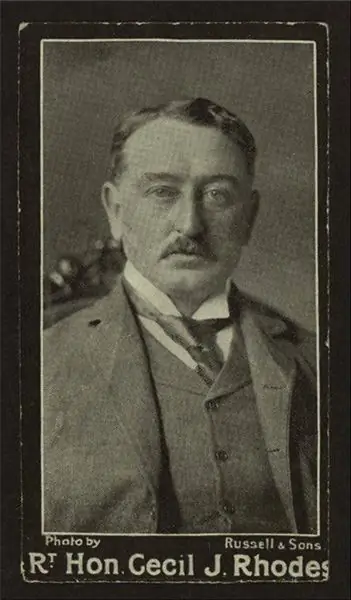
A huge state in Africa was named after him, the area of which was 5 times the territory of England. It is currently divided into two: Northern Rhodesia is now called Zambia, Southern Rhodesia - Zimbabwe.
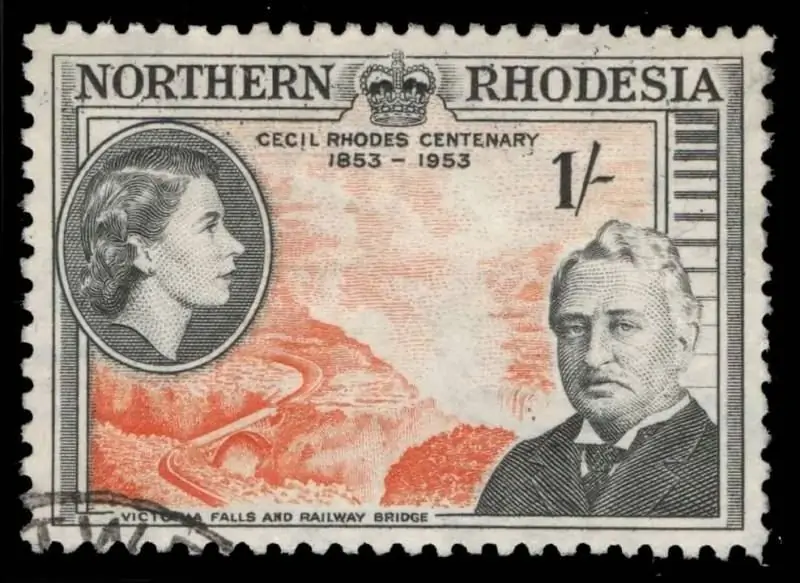
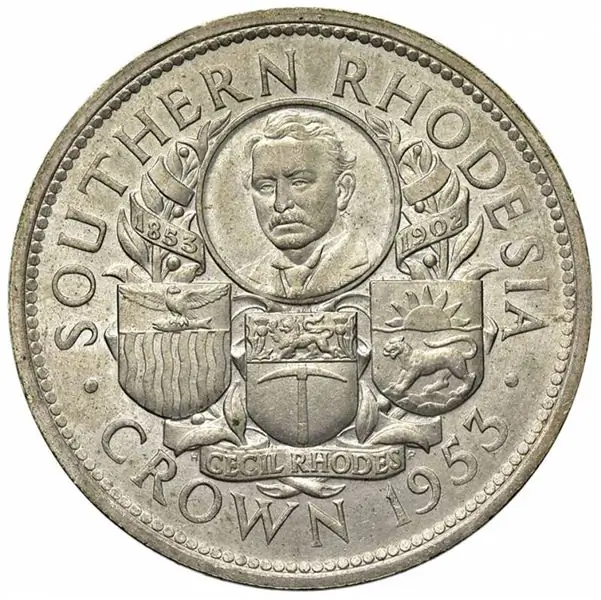
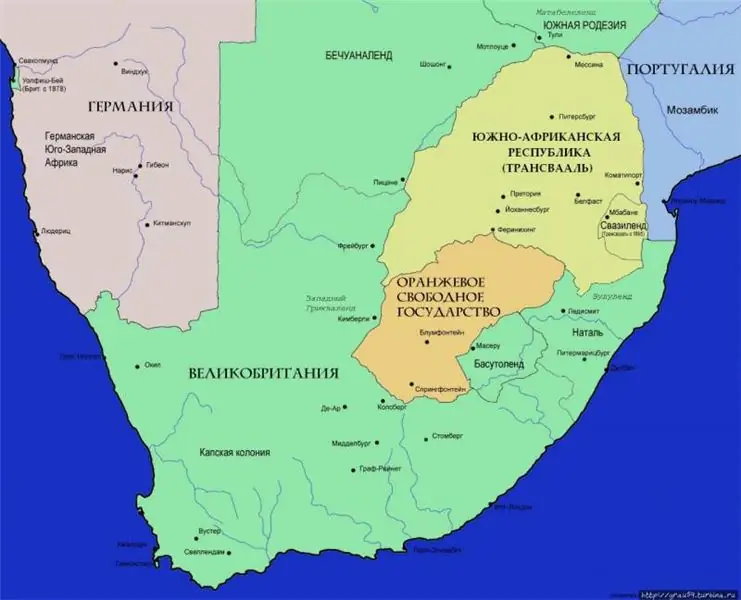
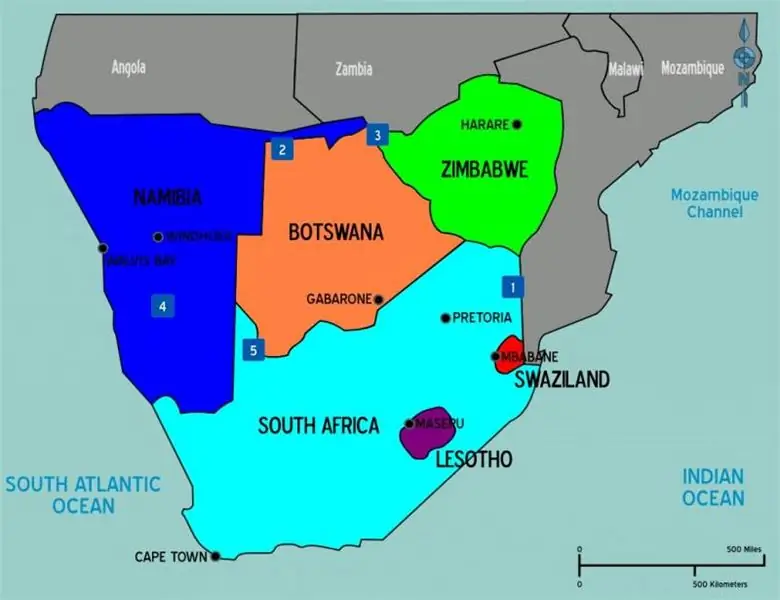
A patriot of the British Empire and a successful businessman, he acted in the spirit of his era - harshly and without much regard for the "aborigines". However, unlike many Russian "oligarchs" who shamelessly rob our country, immediately exporting the capital earned here, Cecil Rhodes spent the bulk of his funds on the development of the territories under his control. From his own funds, he replenished their budget, invested in the construction of railways, financed infrastructure facilities.
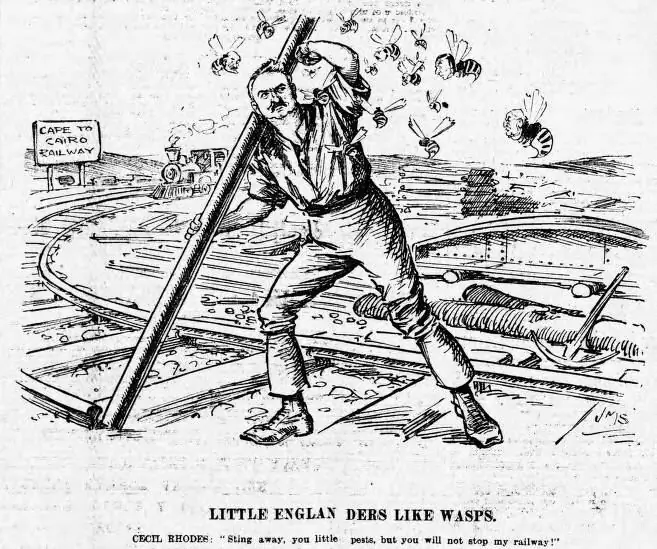
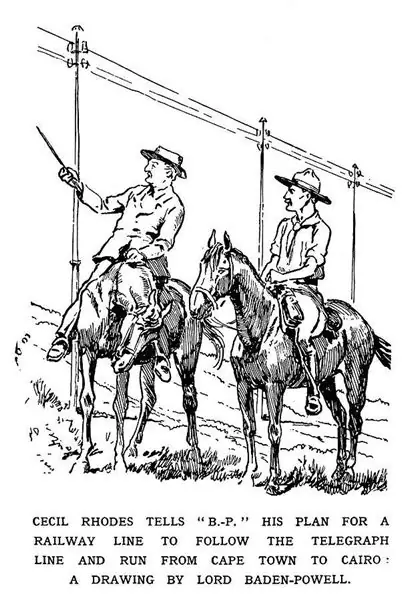
The bulk of the budget of Zimbabwe and Zambia is formed at the expense of income from the mining industry, a large contribution to the development of which this colonizer made.
Rhodes's businesses in South Africa and his investment in infrastructure and education have made the country the richest and most industrialized country in Africa.
His house is Grotte-Schür from 1910 to 1984. was the government seat of the Prime Ministers of South Africa. Rhodes' other two homes currently house museums. And he bequeathed the lands that belonged to him on the slopes of Table Mountain (the most expensive in Cape Town) to the people of South Africa. This area now houses the Kirstenbosch Botanical Garden and the upper campus of the University of Cape Town. It was at the clinic of this university that Christian Barnard performed the world's first heart transplant in 1967. The monument to the benefactor on the territory of this university (you saw his photo at the beginning of the article) was demolished by local mankurt on April 9, 2015:

It is noteworthy that not all students supported this decision of the university leadership and city authorities.
South Africa is now demanding to rename Rhodes University in Grahamstown, established with his funds in 1904.
Liberal professors and students at Oriel College, Oxford, where Rhodes studied, are also demanding that his statue be removed, "".
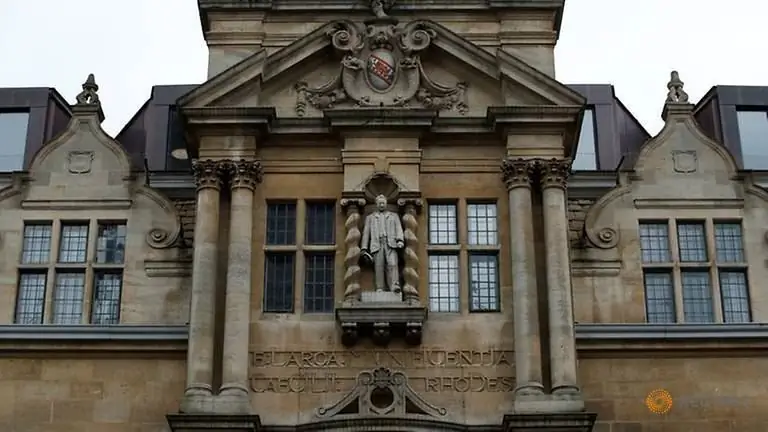

Meanwhile, for many years, the funds donated by this "colonialist" have been paying for the studies of 170 students and graduate students of this college. Currently, this scholarship, which is for two years, “Awarded for high academic ability, sporting achievements, leadership qualities; regardless of race, ethnicity, color, religion, sexual orientation, marital status and social background.»
More than 7 thousand people have already studied with the money of the "colonialist". But the Oxford "fighters" are not interested in such trifles.
Meanwhile, his scholarship was once used, among others, by astronomer E. Hubble, Nobel laureate in medicine H. W. Flory, Prime Minister of Jamaica N. Manley, US Secretary of State D. Rusk, Governor General of New Zealand A. …Porrit, CIA Director S. Turner, Australian Prime Minister R. J. Hawke, US President B. Clinton, NATO Commander-in-Chief W. Clark, President of Warner Brothers and The Walt Disney Company F. Wells. And all the living high-ranking influential fellows are cowardly silent, afraid to publicly speak out in defense of the person to whom they actually owe their current position.
Many South African students also receive Rhodes scholarships, which did not prevent one of these scholars and activist of the youth nationalist movement Ntokozo Kwabe from cynically declaring:
"This scholarship does not buy our silence … There is no hypocrisy about being a recipient of a Rhodes scholarship and publicly criticizing Cecil Rhodes and his legacy."
Personally, I have a completely different opinion on this matter: proudly refuse the money of the "vile colonizer" or "be silent in a rag."
Even during his lifetime, Rhodes was called the "African Napoleon" and was depicted in cartoons as a giant, with one foot in Cairo and the other in Cape Town.
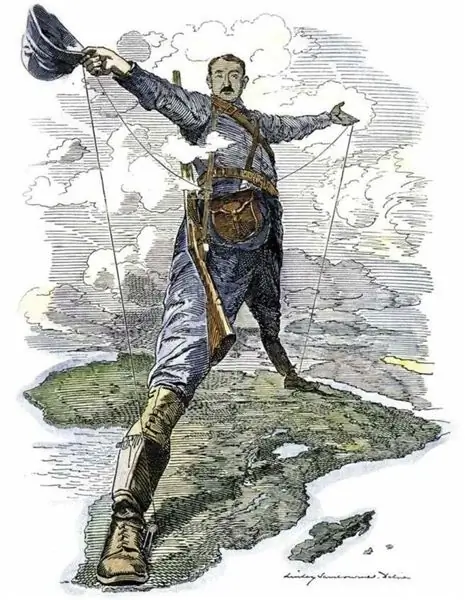
Cecil Rhodes was a patriot of Great Britain and a supporter of the idea of the superiority of the British over people of other nationalities. Consequently - an enemy of other great powers, including Russia. But Rhodes was one of those enemies who should be respected, and whose activities should be studied, drawing certain conclusions. Lenin called Cecil Rhodes "". The British Prime Minister, Lord Salisbury, wrote:
“We live in a century when heroes are possible. One of the most glorious heroes lives among us. Our grandchildren will say about us with envy: “How happy they are! They were contemporaries of the great Cecil Rhodes!"
And further:
"Cecil Rhodes is a very significant person, a man with countless remarkable abilities, exceptional determination and will."
Historian Richard McFarlane, calling Rhodes "", compared him to Washington and Lincoln. Rudyard Kipling admired Rhodes, referring to him as "". Arthur Conan Doyle said Rhodes was sent to Britain from heaven. He wrote about him:
“This is a strange but truly great man, a powerful leader with grandiose dreams, too great to be selfish, but also too determined to be particularly discerning in his means - a man who cannot be measured by our usual human standards, so small for him."
A similar opinion was expressed by the then famous writer Olivia Schreiner, who wrote in one of her letters:
“I will explain my view of Cecil Rhodes with the following parable: Imagine that he died, and, of course, the devils came to take him to hell, to which he rightfully belonged. But it turned out that he was so big that he could not get through either the doors or the windows, and then we had to take him to heaven, against his will."
E. K. Pimenova wrote:
“Rhodes really represented a giant figure in the truest sense of the word. You can make both a hero and a bandit out of him, depending on the point of view from which you look at him."
Mark Twain wrote:
“According to many, Mr. Rhodes is South Africa; others believe that he is only a large part of it."
He also said that every appearance of Rhodes in London attracted "".
In one of the chapters of the book Along the Equator, Twain wrote:
“I admire him, I honestly admit; and when his time comes, I will buy a piece of rope as a keepsake to hang him on."
The liberal Bernard Shaw considered "".
Historian Raymond Mensing, by the way, called Rhodes "". In the Encyclopædia Britannica you can now read that Rhodes
"Once defined his policy as" equal rights for every white person south of the Zambezi, "but later changed the concept of" white "to" civilized."
That is, he admitted the possibility of obtaining equal rights for "civilized blacks", although, in his opinion, they will not reach a sufficient level of civilization soon. In the meantime, he believed, "".
It is curious that this was precisely the position of the overwhelming majority of Russian landowners in relation to their serfs: someday we will definitely free them, but now it is impossible. Because the village peasants are like little children: without a lordly supervision they will immediately get drunk, stop working and die of hunger. But for some reason no one accuses the "landowners Troyekurovs", "lieutenants Golitsyn" and "cornet Obolensky" of racism.
Hannah Arendt even compared Rhodes to Hitler. By the way, has anyone heard of Hannah Arendt? This is a Jewish woman who was born in Germany, from where she moved to France, and then settled in the United States. The author of the works "Anti-Semitism", "Imperialism", "The Origins of Totalitarianism", which are declared by the liberals to be almost the pinnacle of philosophical thought. And which, of their own free will, no one has ever read.
Under a different set of circumstances, in the place of Cecil Rhodes there could be another person who would have been forced to act with the same methods. But the big question is - would anyone else be able to achieve such success in such a short time, create one of the richest and most successful companies in the world from scratch and have such a large-scale impact on the fate of several states?






